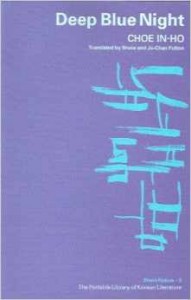 Choe In-ho’s Deep Blue Night is one of my favorite of the Portable Library of Korean Literature translations, partly because it’s theme is so accessible to a western reader. It is a combination of a travelogue and that most quintessential American literary form, the buddy road-trip. The story begins with a scene reminiscent of the opening scene of Lee Kyoun-young’s The Other Side of Dark Remembrance; an unnamed narrator waking up after a paralyzing night of drinking. He is shortly revealed to be Hyeong, a man on a road-trip with his friend Jun-ho, who has been exiled from Korea because of a drug arrest. They have traveled a pretty average Korean tourist arc, Disneyland, Grand Canyon, Yosemite, San Francisco, and now they are on their return trip to Los Angeles.
Choe In-ho’s Deep Blue Night is one of my favorite of the Portable Library of Korean Literature translations, partly because it’s theme is so accessible to a western reader. It is a combination of a travelogue and that most quintessential American literary form, the buddy road-trip. The story begins with a scene reminiscent of the opening scene of Lee Kyoun-young’s The Other Side of Dark Remembrance; an unnamed narrator waking up after a paralyzing night of drinking. He is shortly revealed to be Hyeong, a man on a road-trip with his friend Jun-ho, who has been exiled from Korea because of a drug arrest. They have traveled a pretty average Korean tourist arc, Disneyland, Grand Canyon, Yosemite, San Francisco, and now they are on their return trip to Los Angeles.
Hyeong frequently discusses seeing things that will be forgotten – what it is to see things that will never be seen again. This theme is actually a precursor to the main theme of the story, that of alienation from homeland. In Deep Blue Night we see something like the traditional Korean arc of separation and (with luck, the ending is ambivalent) return. Even in Korean modern literature set in the United States, you don’t have to scratch very hard to reveal pundhan munhak at the heart of the story. Hyeong eventually makes this explicit when he reveals that his visit to the United States is of no interest to him, “The sole purpose of his journey was not to see … His journey to America was a journey to a self-chosen land of exile.” (45)
Deep Blue Night is a fun read, Jun-ho is presented as a pretty clearly identifiable character, the amiable pot-smoking dolt. Choe’s writing is expressive (and often surprising) as in his description of sunset on the coast, “The army of the sea launches a concentrated fusillade against the disintegrating realm of heaven. Shells explode in a burst of sparks, illuminating the darkness on high with shards of light.” (57)
There are revealing cultural glimpses as well. In Buckwheat Season, one of the classic stories (particularly for Koreans) of Korean modern literature, there is a scene in which two friends play out an oft-repeated scene between each other as one retells an annoying story:
Cho had heard it often enough since making friends with Ho, but he could not bring himself to reveal his boredom. Ho, on his part, feigned indifference and went on as he pleased.
Choe updates this to the inside of an automobile
Jun-ho had a bad habit: he liked his music very loud … The idea was not so much to enjoy the music as to shower himself with it.
With the windows rolled up tight, he [Hyeong] himself felt trapped in a closet. In this small, speeding closet the piercing sound of the music was torture. But he made up his mind not to reveal these feelings. (29)
This is, of course, quite a Korean approach – a deeply respectful approach to kibun.
Choe uses automotive speed in a way quite similar to Kim Young-ha’s use in I Have the Right to Destroy Myself, as a metaphor for modern separation, each one of us endures. As their ability to deal with this anomic existence wears away, so does the mechanical capacity of their automobile. At the end, when Hyeong and Jun-ho are stranded, lost on a highway they hadn’t intended to follow, when their car has finally choked to a grinding halt, with Jun-ho’s secret misery revealed, only then can the characters come face to face with their essential isolation and exile. Lost and weeping, dazed and repentant they both promise/beg to return to their community. Conquered and weak, they long for return. Deep Blue Night concludes with Hyeong broken on the beach, his desires clear, but his future opaque.
Google shows me that this has been made into a Korean movie, although the poster is somewhat alarming in that it most prominently features a woman and child, and there are essentially none active in the story. And reading the movie synopsis it becomes clear that the written story was completely bastardized, alas.
The remainder of the book is filled out with a short story, The Poplar Tree. A kind of meditation, The Poplar Tree is 10 pages long and allegorically addresses issues of desire, transformation, and extinction. Distinctly Buddhist in tone, it interweaves the story of a boy and a blacksmith, and an apple and an oak tree. Somewhere between a koan and a story, it manages to be whimsical and bittersweet. In a way, it is a nice palate-cleanser after the jangled and unhappy tone of Deep Blue Night.
Two good stories, well paired.


